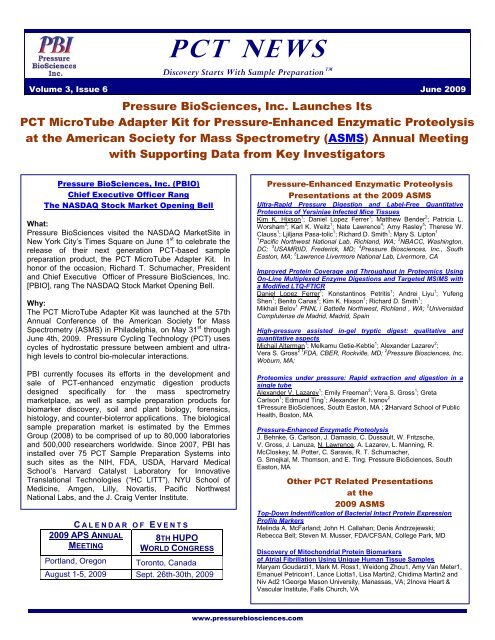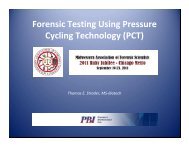PCT News Discovery Starts With Sample Preparation - Pressure ...
PCT News Discovery Starts With Sample Preparation - Pressure ...
PCT News Discovery Starts With Sample Preparation - Pressure ...
Create successful ePaper yourself
Turn your PDF publications into a flip-book with our unique Google optimized e-Paper software.
P C T N e w s<br />
<strong>Discovery</strong> <strong>Starts</strong> <strong>With</strong> <strong>Sample</strong> <strong>Preparation</strong> TM<br />
Volume 3, Issue 6 June 2009<br />
<strong>Pressure</strong> BioSciences, Inc. Launches Its<br />
<strong>PCT</strong> MicroTube Adapter Kit for <strong>Pressure</strong>-Enhanced Enzymatic Proteolysis<br />
at the American Society for Mass Spectrometry (ASMS) Annual Meeting<br />
with Supporting Data from Key Investigators<br />
<strong>Pressure</strong> BioSciences, Inc. (PBIO)<br />
Chief Executive Officer Rang<br />
The NASDAQ Stock Market Opening Bell<br />
What:<br />
<strong>Pressure</strong> BioSciences visited the NASDAQ MarketSite in<br />
New York City’s Times Square on June 1 st to celebrate the<br />
release of their next generation <strong>PCT</strong>-based sample<br />
preparation product, the <strong>PCT</strong> MicroTube Adapter Kit. In<br />
honor of the occasion, Richard T. Schumacher, President<br />
and Chief Executive Officer of <strong>Pressure</strong> BioSciences, Inc.<br />
[PBIO], rang The NASDAQ Stock Market Opening Bell.<br />
Why:<br />
The <strong>PCT</strong> MicroTube Adapter Kit was launched at the 57th<br />
Annual Conference of the American Society for Mass<br />
Spectrometry (ASMS) in Philadelphia, on May 31 st through<br />
June 4th, 2009. <strong>Pressure</strong> Cycling Technology (<strong>PCT</strong>) uses<br />
cycles of hydrostatic pressure between ambient and ultrahigh<br />
levels to control bio-molecular interactions.<br />
PBI currently focuses its efforts in the development and<br />
sale of <strong>PCT</strong>-enhanced enzymatic digestion products<br />
designed specifically for the mass spectrometry<br />
marketplace, as well as sample preparation products for<br />
biomarker discovery, soil and plant biology, forensics,<br />
histology, and counter-bioterror applications. The biological<br />
sample preparation market is estimated by the Emmes<br />
Group (2008) to be comprised of up to 80,000 laboratories<br />
and 500,000 researchers worldwide. Since 2007, PBI has<br />
installed over 75 <strong>PCT</strong> <strong>Sample</strong> <strong>Preparation</strong> Systems into<br />
such sites as the NIH, FDA, USDA, Harvard Medical<br />
School’s Harvard Catalyst Laboratory for Innovative<br />
Translational Technologies (“HC LITT”), NYU School of<br />
Medicine, Amgen, Lilly, Novartis, Pacific Northwest<br />
National Labs, and the J. Craig Venter Institute.<br />
C A L E N D A R O F E V E N T S<br />
2009 APS ANNUAL<br />
MEETING<br />
8TH HUPO<br />
WORLD CONGRESS<br />
Portland, Oregon Toronto, Canada<br />
August 1-5, 2009 Sept. 26th-30th, 2009<br />
<strong>Pressure</strong>-Enhanced Enzymatic Proteolysis<br />
Presentations at the 2009 ASMS<br />
Ultra-Rapid <strong>Pressure</strong> Digestion and Label-Free Quantitative<br />
Proteomics of Yersiniae Infected Mice Tissues<br />
Kim K. Hixson 1 ; Daniel Lopez Ferrer 1 ; Matthew Bender 2 ; Patricia L.<br />
Worsham 3 ; Karl K. Weitz 1 ; Nate Lawrence 4 ; Amy Rasley 5 ; Therese W.<br />
Clauss 1 ; Ljiljana Pasa-tolic 1 ; Richard D. Smith 1 ; Mary S. Lipton 1<br />
1 Pacific Northwest National Lab, Richland, WA; 2 NBACC, Washington,<br />
DC; 3 USAMRIID, Frederick, MD; 4 <strong>Pressure</strong> Biosciences, Inc., South<br />
Easton, MA; 5 Lawrence Livermore National Lab, Livermore, CA<br />
Improved Protein Coverage and Throughput in Proteomics Using<br />
On-Line Multiplexed Enzyme Digestions and Targeted MS/MS with<br />
a Modified LTQ-FTICR<br />
Daniel Lopez Ferrer 1 ; Konstantinos Petritis 1 ; Andrei Liyu 1 ; Yufeng<br />
Shen 1 ; Benito Canas 2 ; Kim K. Hixson 1 ; Richard D. Smith 1 ;<br />
Mikhail Belov 1 PNNL / Battelle Northwest, Richland , WA; 2 Universidad<br />
Complutense de Madrid, Madrid, Spain<br />
High-pressure assisted in-gel tryptic digest: qualitative and<br />
quantitative aspects<br />
Michail Alterman 1 ; Melkamu Getie-Kebtie 1 ; Alexander Lazarev 2 ;<br />
Vera S. Gross 2 1 FDA, CBER, Rockville, MD; 2 <strong>Pressure</strong> Biosciences, Inc,<br />
Woburn, MA;<br />
Proteomics under pressure: Rapid extraction and digestion in a<br />
single tube<br />
Alexander V. Lazarev 1 ; Emily Freeman 2 ; Vera S. Gross 1 ; Greta<br />
Carlson 1 ; Edmund Ting 1 ; Alexander R. Ivanov 2<br />
1<strong>Pressure</strong> BioSciences, South Easton, MA ; 2Harvard School of Public<br />
Health, Boston, MA<br />
<strong>Pressure</strong>-Enhanced Enzymatic Proteolysis<br />
J. Behnke, G. Carlson, J. Damasio, C. Dussault, W. Fritzsche,<br />
V. Gross, J. Lanuza, N. Lawrence, A. Lazarev, L. Manning, R.<br />
McCloskey, M. Potter, C. Saravis, R. T. Schumacher,<br />
G. Smejkal, M. Thomson, and E. Ting. <strong>Pressure</strong> BioSciences, South<br />
Easton, MA<br />
Other <strong>PCT</strong> Related Presentations<br />
at the<br />
2009 ASMS<br />
Top-Down Indentification of Bacterial Intact Protein Expression<br />
Profile Markers<br />
Melinda A. McFarland; John H. Callahan; Denis Andrzejewski;<br />
Rebecca Bell; Steven M. Musser, FDA/CFSAN, College Park, MD<br />
<strong>Discovery</strong> of Mitochondrial Protein Biomarkers<br />
of Atrial Fibrillation Using Unique Human Tissue <strong>Sample</strong>s<br />
Maryam Goudarzi1, Mark M. Ross1, Weidong Zhou1, Amy Van Meter1,<br />
Emanuel Petricoin1, Lance Liotta1, Lisa Martin2, Chidima Martin2 and<br />
Niv Ad2 1George Mason University, Manassas, VA; 2Inova Heart &<br />
Vascular Institute, Falls Church, VA<br />
www.pressurebiosciences.com
P C T N e w s<br />
<strong>Discovery</strong> <strong>Starts</strong> <strong>With</strong> <strong>Sample</strong> <strong>Preparation</strong> TM<br />
Volume 3, Issue 6 June 2009<br />
Excerpt from PBI Poster<br />
Presented at the 2009 ASMS<br />
Proteomics Under <strong>Pressure</strong>: rapid<br />
extraction and digestion in a single tube<br />
ALEXANDER V. LAZAREV1; Emily Freeman2; Vera S.<br />
Gross1; Greta Carlson1; Edmund Ting1; Alexander R.<br />
Ivanov2. 1<strong>Pressure</strong> BioSciences, South Easton, MA ;<br />
2Harvard School of Public Health, Boston, MA<br />
Introduction<br />
Hydrostatic pressure has been previously shown to enhance<br />
enzymatic hydrolysis by trypsin [1, 2], chymotrypsin and<br />
pepsin [3, 4], as well as by Alcalase, Neutrase, Corolase 7089,<br />
Corolase PN-L, and papain [5, 6]. In our preliminary<br />
experiments, we have confirmed the positive effects of<br />
pressure and additional benefits of alternating hydrostatic<br />
pressure (pressure cycling technology, or <strong>PCT</strong>) for several<br />
enzymes including proteinase K, PNGase F, Lys-C and<br />
lysozyme. However, the mechanisms of pressure-induced<br />
acceleration remain speculative, and the influence of various<br />
chemical agents on enzymatic activity, substrate conformation<br />
and efficiency of the digestion process are not well<br />
understood, which leads to great variability of experimental<br />
results between groups which have attempted to employ <strong>PCT</strong>enhanced<br />
digestion methods.<br />
The <strong>Pressure</strong> Cycling Technology <strong>Sample</strong> <strong>Preparation</strong> System<br />
(<strong>PCT</strong> SPS) applies alternating hydrostatic pressure between<br />
ambient and ultra high levels to control molecular interactions<br />
[7]. The <strong>PCT</strong> SPS has been successfully used in a variety of<br />
applications, including cell and tissue lysis, and the extraction<br />
of proteins, lipids and nucleic acids [8]. Recently, <strong>PCT</strong> has also<br />
been shown to accelerate enzymatic reactions such as<br />
proteolysis [1]. The <strong>PCT</strong> SPS (Figure 1) is comprised of a<br />
small, semi-automated bench-top instrument (Barocycler<br />
NEP3229 or NEP2320) and single-use sample processing<br />
containers called PULSE Tubes (<strong>Pressure</strong> BioSciences, Inc.,<br />
South Easton, MA). Used together, the PULSE Tubes<br />
transmit the pressure generated by the Barocycler to the<br />
sample, resulting in pressure enhanced proteolysis and<br />
accelerated genomic DNA isolation.<br />
<strong>PCT</strong> MicroTubeTM Adapter Kit*<br />
for<br />
<strong>Pressure</strong>-Enhanced Enzymatic Proteolysis<br />
See Brochure<br />
with Data and Comments from<br />
Thermo Fisher, FDA, NYU School of Medicine, Mississippi<br />
State University and<br />
Harvard School of Public Health<br />
In this work we explore the stability and catalytic activity of<br />
trypsin and chymotrypsin under the influence of several<br />
chaotropes and organic solvents in combination with<br />
hydrostatic pressure and elevated temperatures. We have<br />
employed chromogenic substrates in order to measure<br />
enzyme activity independent of pressure-induced changes in<br />
substrate protein conformation. Additionally, using high<br />
performance LC-MS analysis, we have tested the effect of the<br />
factors outlined above on efficiency, selectivity, and throughput<br />
of proteolytic digestion. Analysis of the data obtained thus far<br />
leads to a set of guidelines for development of optimized and<br />
highly reproducible pressure-enhanced digestion methods.<br />
Continued on Page 3<br />
www.pressurebiosciences.com
P C T N e w s<br />
<strong>Discovery</strong> <strong>Starts</strong> <strong>With</strong> <strong>Sample</strong> <strong>Preparation</strong> TM<br />
Volume 3, Issue 6 June 2009<br />
Excerpt from PBI Poster Presented at the 2009 ASMS (continued)<br />
Proteomics Under <strong>Pressure</strong>: rapid<br />
extraction and digestion in a single tube<br />
Excerpt from PBI Poster Presented at the 2009 ASMS (continued)<br />
Proteomics Under <strong>Pressure</strong>: rapid<br />
extraction and digestion in a single tube<br />
A<br />
C<br />
B<br />
Conclusion<br />
<strong>Pressure</strong> cycling has been shown to significantly improve<br />
proteolysis with a number of enzymes. High hydrostatic<br />
pressure acts synergistically with chaotropes and organic<br />
solvents to boost the effects of these chemicals on protein<br />
denaturation and digestion These effects not only improve<br />
digestion efficiency and save significant time, but also allow<br />
the use of much lower concentrations of denaturants, which<br />
can simplify and improve downstream applications. While such<br />
effects are clearly beneficial, care must be taken in<br />
development of <strong>PCT</strong>-enhanced digestion methods to avoid<br />
impairment of enzymatic activity due to denaturation of the<br />
enzyme itself. The following points illustrate some of our recent<br />
findings:<br />
Figure 2. <strong>PCT</strong> MicroTubes. A) Standard <strong>PCT</strong> MicroTubes. B)<br />
<strong>PCT</strong> MicroTube cartridge system. C) <strong>PCT</strong> MicroTubes with gelpicking<br />
caps available in 50 µl, 100 µl and 150 µl sizes.<br />
1. Chymotrypsin activity can be significantly enhanced by<br />
performing digestion using cycled pressure.<br />
2. Under cycled pressure, 0.5 M Guanidine-HCl inhibits trypsin<br />
but not chymotrypsin activities.<br />
3. Under cycled pressure, 4% HFIP enhances trypsin but<br />
inhibits chymotrypsin activities.<br />
Grand Total: 1077<br />
4. <strong>Pressure</strong> levels above 20,000 psi exhibit negative effect on<br />
trypsin activity.<br />
912<br />
<strong>PCT</strong>-assisted<br />
243<br />
669<br />
“Conventional”<br />
165<br />
5. Under cycled pressure, trifluoroethanol (TFE) below 15%<br />
enhances trypsin but inhibits chymotrypsin activities (data not<br />
shown).<br />
Enriched with<br />
cytosolic<br />
proteins<br />
834<br />
Enriched with<br />
organelle and<br />
membrane<br />
proteins<br />
6. Under cycled pressure, both methanol and urea can be<br />
included in trypsin digests at low concentration, but become<br />
rapidly inhibitory at higher concentrations.<br />
7. <strong>Pressure</strong> cycling instrumentation could be used to enhance<br />
cell lysis and protein digestion in the same sample container to<br />
minimize sample handling and potential loss of analytes.<br />
Figure 14. Overlap of detected HepG2 proteomes extracted<br />
by a conventional method and by <strong>PCT</strong>. The lower plots<br />
demonstrate GO localization terms differentially enriched in the<br />
non-overlapping fraction of detected proteomes.<br />
www.pressurebiosciences.com












